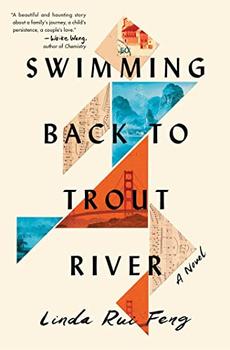Summary | Excerpt | Reviews | Beyond the Book | Readalikes | Genres & Themes | Author Bio

Junie's eyes lit up with laughter, as if she'd been reminded of a successful stunt pulled off by someone her age.
"Don't laugh," Cassia said. "Promise to never make your grandparents worried like that."
Before they boarded the train, Cassia had scraped her memory for tidbits from Momo's boyhood—things they'd talked about during their courtship and the early years of marriage. She was planning to impart these tidbits to Junie, through repetition and review, to allow for a seamless transition into this new ecosystem and new life.
She knew she had a lot to compete with—the scenery outside, the chatter and laughter of strangers inside. Over the rest of the journey, she began to take more liberties with the stories, until they became expansive like a rustic saga. It now involved not just tigers (too remote and menacing) but also sparrows (which he caught during the lean years), plus a river turtle that he befriended (to show Junie that not all animals were food).
It was the closest Cassia had felt to Momo in a long time. After all, wasn't it true that to love someone is to figure out how to tell yourself their story? She could almost see him in his prepubescence, running through the feral paths and brimming with vitality that had no place to go. When she imagined him like this, unformed and far from invincible, it was much easier to forgive him for his absurd optimism.
As the train trundled south and crossed first the Yellow River, then the Yangtze, and eventually entered the long mountain tunnel toward Trout River, Cassia even thought that this was how the two of them might start over, if starting over was still possible.
On the day that Cassia was to return up north without Junie, she took a walk over a stone bridge with Junie riding on her back. It was autumn, and underneath them, the river that gave the small town its name gurgled with shifting pitches and rhythms in a way that Junie thought resembled singing. She shook Cassia's shoulder to point this out, but Cassia did not seem to relish the river, or anything at all.
Cassia stood out against the fluid movements and chatter of Junie's grandparents, more like a dam than a rampart. Junie could see that something about Cassia made her not belong in Trout River. But the way the world was laid out here amid the water and leaves made sense to Junie in a way that life with Momo and Cassia did not—for example, how Cassia was always worried about something they couldn't see. Or the way Momo pressed Junie's fingers down on the cold violin strings even though she told him it hurt—and the way he got angry when she fought off The Violin Monster and broke it by accident.
For the time being—this was what the adults all said about her being here, but Junie didn't think that this was a temporary arrangement. She heard this in Cassia's tone, in the urgency and finality of her admonition: They know what's good for you.
Junie did not cry when they said good-bye to Cassia.
That night when she began life with her grandparents, Junie watched Grandpa wash his feet before going to bed. For most of his life, Grandpa had been a carpenter and tinkerer, though only his age, and not his occupation, was evident from his submerged feet.
Junie scooted over toward him on her knees, reached into the well-worn tub where his feet were planted, and poked at the gnarled sinews and bones in them.
"Your legs grew roots, Grandpa," Junie said, "like those trees by the river!"
He looked at her, then down at his own feet.
"Do you think my legs will grow roots like yours, when I'm older?"
Grandpa now looked over at Grandma, and the look they exchanged was one passed between long-married couples that allowed them to synchronize backstories and action plans. Grandma shuffled over to scoop up Junie from the floor. She plopped her down onto her knees.
.
Your guide toexceptional books
BookBrowse seeks out and recommends the best in contemporary fiction and nonfiction—books that not only engage and entertain but also deepen our understanding of ourselves and the world around us.